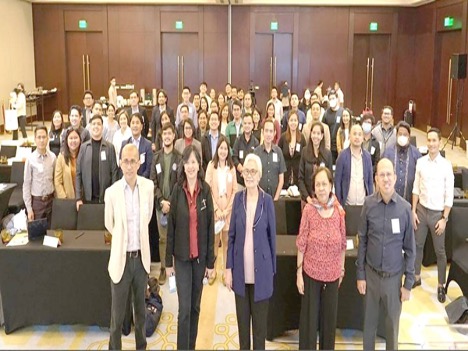
BY LEANDER C. DOMINGO
LOS BAÑOS (November 26)—The Philippine government-hosted Southeast Asian Regional Center for Graduate Study and Research in Agriculture (Searca) has empowered young scientists in a recently held forum titled “2022 Future Science Leaders’ Forum” (FSLF).
During the FSLF, Searca Director Glenn Gregorio spoke on building a culture of agricultural innovation for sustainable impact through new ways of working and thinking, participatory governance, adoption of ideas, strategies, and innovating sources of funding and financing.
Consisting of plenary sessions on building a culture for research and innovation, building institutions, collaboration and linkages, mentoring, and science and society, the forum on November 11 in Manila was organized by the National Academy of Science and Technology, Philippines (NAST-PHL).
It was an avenue to empower young Filipino science leaders and create a pool of potential NAST scholars and awardees, where the activity is tailored for individuals who show significant promise for leadership in their chosen field with demonstrated outstanding accomplishments in their respective fields.
Also, a NAST academician under the Agricultural Sciences Division and professor at the University of the Philippines Los Baños, Gregorio emphasized in his presentations the innovations for transformational change and how to reinforce a transformed agricultural food system in the Philippines and Southeast Asia and discussed policy recommendations to strengthen capacities of higher education institutions.
“We need to highlight the need for food system innovations toward achieving food security and sovereignty through more public and value-driven research initiatives that are geared toward strengthening local food systems. Science and technology-based extension services are also important to sustain community engagement and public service,” Gregorio said.
In his discussion, he also presented the Digital Agriculture Exchange (AgriEX) platform, Searca’s initiative to modernize traditional farming and improve the livelihood of smallholder farmers; the Innovation Olympics 2.0, a national competition challenging the next generation of agri-startups to develop innovative agri-solutions; and FlexPHD: Food is Life Exemplified, a mobile application development competition for planetary health diet, among others.
Gregorio also shared learning tools that form part of Searca’s newest facility, the Searca Hub for Agriculture and Rural Innovation for the Next Generation, also called Sharing.
This includes AgrinnoQuest digital self-tour, objective displays with informative QR codes, on-demand videos, interactive projectors, computer tablets, 3D printers and pens, and agriculture-inspired art installations.
“Universities are where invention happens. But partnering with the industry sector is when innovation happens. Innovation is the act of turning research results into revenues and eventually into economic and social gains. In the end, let us all remember that what matters the most is building relationships,” he told young scientists.
